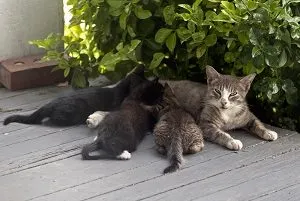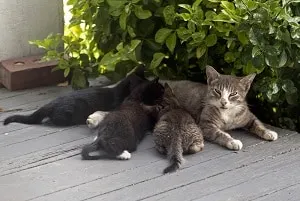 The topic of a mother cat eating her kittens can come off as horrific and grim. It is almost unfathomable to think that a mother could do this to her offspring. However, the answer to this question might surprise you. So, do cats eat their kittens?
The topic of a mother cat eating her kittens can come off as horrific and grim. It is almost unfathomable to think that a mother could do this to her offspring. However, the answer to this question might surprise you. So, do cats eat their kittens?
Cats do eat their kittens although this behavior is not typical. Feral cats have a propensity towards eating their kittens if they are unhealthy. This behavior is less frequent in domesticated cats. Cats are known to eat the placenta of their kitten for nutritional benefits.
Mother cats will often not eat their kittens if they are healthy, although this does occur. So, what could cause a mother cat to eat her kittens? There are various situations and circumstances that might have an effect on the mother and might prompt her to eat her kittens. Let’s dive into some of the reasons why a mother cat might ingest her kittens.
Why Do Cats Eat Their Kittens
While it is rare for a mother cat to eat her kittens, there are certain circumstances under which she may feel the need to do so.
Diseases, Deformity And Illness
Cats have a powerful olfactory sense. Their sense of smell is 14 times stronger than a human’s. You may have heard of dogs who can smell cancer and other illnesses. Cats can function in the same way. A mother cat may be able to sense or smell a disease, illness, or deformity that a human may not perceive.
If a mother cat senses that her kitten may be ill or is unlikely to survive, she may kill it out of mercy. If the odds of survival are very low and the kitten does indeed die, decomposition of its corpse not only proposes a hygiene risk to the rest of the litter but also attracts predators to the nest. So, the mother will consume the weak or dying kitten to protect the rest of her litter and herself. Likewise, if a kitten is stillborn, she will also, possibly, consume her kitten for the same reasons. This seems to be a biological impulse associated with the “survival of the fittest” instincts.
Stressful Environment Or Fear Of Danger For Newborn Kittens
This situation mostly applies to feral cats. Feral cats who live in the wild have a more difficult time surviving and are faced with a broader range of dangers than domesticated cats. If a cat feels that her brood is in immediate danger from a predator, she may feel it is more merciful for her to end her own kitten’s life than to end up in the clutches of a predator.
Mothers are also often extra nervous after giving birth, so any added stimulation could result in sensory overload, causing the mother to become stressed. Examples could be busy areas, too much interaction from people or other animals, loud noises, or other painful stimuli.
Anything that a mother cat could see as threatening might cause her to eat her litter out of stress. However, this is rare.
Stressful Labor And Delivery
Giving birth requires a lot of energy, so a cat may eat a kitten to nourish itself and replenish its lost energy. This can also happen as a result of stressful breastfeeding. Breastfeeding requires quite a bit of energy, and it can be very exhausting for the mother cat. Studies indicate that nursing mother cats show signs of elevated cortisol levels.
Cortisol is the stress hormone that regulates strong processes such as mood and fear. In cases of prolonged elevated cortisol levels, it may induce a fight or flight response in the mother. On the other hand, these cases are also rare.
First Time Motherhood
Being a new mother can often be confusing for a cat. Having never given birth before, a new mother may be unsure of what to do.
- They may not know how to care for their kittens and might be unusually rough with their kittens, although many times, this is unintentional.
The hormone, Prolactin, is a nurturing hormone that is excreted during pregnancy, labor, and birth. Essentially, Prolactin is the hormone responsible for bonding the mother to her babies. Sometimes, there is a delayed response in this hormone. This can be more common for a first-time mother. Hence, when Prolactin is postponed in a first-time mother, she may not feel that immediate bond to her kittens and may not feel motivated to nurture her newborn kittens. Under unique circumstances, she may even perceive her newborn kittens as a threat or as prey.
Malnourishment Or Lack Of Nutrition
Female felines often eat the placenta for its nutritional benefits.
The placenta contains fiber, protein, iron, potassium, and is thought to increase milk supply. In the same regard, a queen will sometimes eat one kitten or even an entire litter if she is malnourished or close to starving.
- Doing this will provide nutritional benefits to the mother cat, which she can then pass along to any remaining kittens through her milk supply during nursing.
Feline Mastitis
There are some instances where a nursing mother cat will end up with Mastitis, a condition in which the mammary gland becomes inflamed. This is caused by a bacterial infection and can be extremely painful for the mother, particularly when nursing. The infection can be passed on to her kittens, as well. Under extraordinary circumstances, pain, which, in turn, causes stress may be a potential reason that a mother might eat her young. If she senses that her kittens may be sick from infection, she may feel the need to kill them humanely.
When A Cat Does Not Recognize Their Young
Cats rely on smell to identify their young. When kittens are first born, their mother will lick them to imprint her scent on them. If newborn kittens have been disturbed by another animal or a person, then the mother’s scent could be masked, causing her to be unable to recognize her kittens.
- This is why it is crucial to restrain from handling the kittens in their first week of life unless necessary. The danger that lies in a mother being unable to recognize her kittens is that she may confuse them for prey rather than offspring.
Do Male Cats Eat Their Kittens
No. Male cats typically do not eat their kittens unless they are in extreme circumstances like starvation.
On the other hand, male cats will eat other kittens that they did not sire. The primal objective of a male cat is to continue its bloodline and pass on its genetics.
When a female cat is nursing, she is in no condition to mate. In reaction to this, a male cat may kill kittens that are not from his bloodline, to bring the female into heat, so that he can breed with her to produce his own kittens. Male cats may also kill kittens for territorial reasons.
Do Cats Eat Their Kittens If You Touch Them
Cats will typically not eat their kittens if you touch them. She will most likely move her litter to a new location. However, if the cat is confined or unable to move her kittens to a safer location, she may kill them if she feels apprehensive about their safety and feels that they might be threatened.
Similarly, in an attempt to move them to safety, a cat may accidentally kill her kitten by trying to push it under or into something.
Likewise, a female cat with psychological trauma may also kill her kittens. For instance, a cat who has been abused may see fit to kill her kittens out of what she considers mercy. This is atypical.
As we mentioned before, the scent is essential for the mother cat to bond to her kittens. In limiting contact with the kittens yourself, it lowers the odds of the mother cat being unable to recognize her kittens. So again, it is wise to show restraint in the first week or so.
How Do I Get My Cat To Stop Eating Her Kittens
When considering some of the factors that may cause a queen to eat her kittens, we need to tackle this problem from a preventative angle first as much as possible. This includes providing a calm, relaxing environment for your feline during pregnancy, birth, and afterward. Try to avoid contact with the kittens in the first week. Ensure that you are diligently monitoring your cat and her new babies so that you will notice any unusual behavior.
If you notice that the mother seems to be ignoring the babies or not caring for them properly, or if she is unusually rough with them, then the safest option may be to remove the kittens from their mother. Once you remove the kittens from their mother, you will have to care for them as their mother would. Your vet can help you determine the best way to care for your kittens.
If your cat exhibits a lack of maternal behavior, she may not be fit to be a parent. In which case, you may want to have her spayed so that she cannot have any more kittens.
Do Cats Eat Other Cat’s Kittens
Generally, most female cats will not eat other cats’ kittens. Most female felines are hardwired to work cooperatively in raising litters. The most significant risk is from male cats looking to breed.
This is not to say that some female cats may not perceive small kittens as prey. Equally, some queens may see kittens from other litters as their enemy, especially if she does not get along with the other mother. Although, there is a slim possibility of this happening, feline mothers are more known for stealing each other’s kittens and nursing them as a concerted and collective effort.

My name is James, and welcome to FAQCats!
Along with our team of cat owners, expert pet enthusiasts, and pet professionals, we aim to write engaging helpful, engaging content about cats. At FAQCats we strive to provide content that’s accurate and fun to read. Our team writes about everything related to cats; even the most complex of topics. Through extensive research and caring for our own fur-pals, we’re able to provide something cat owners worldwide will love. Have a look around, and leave us feedback anytime!

